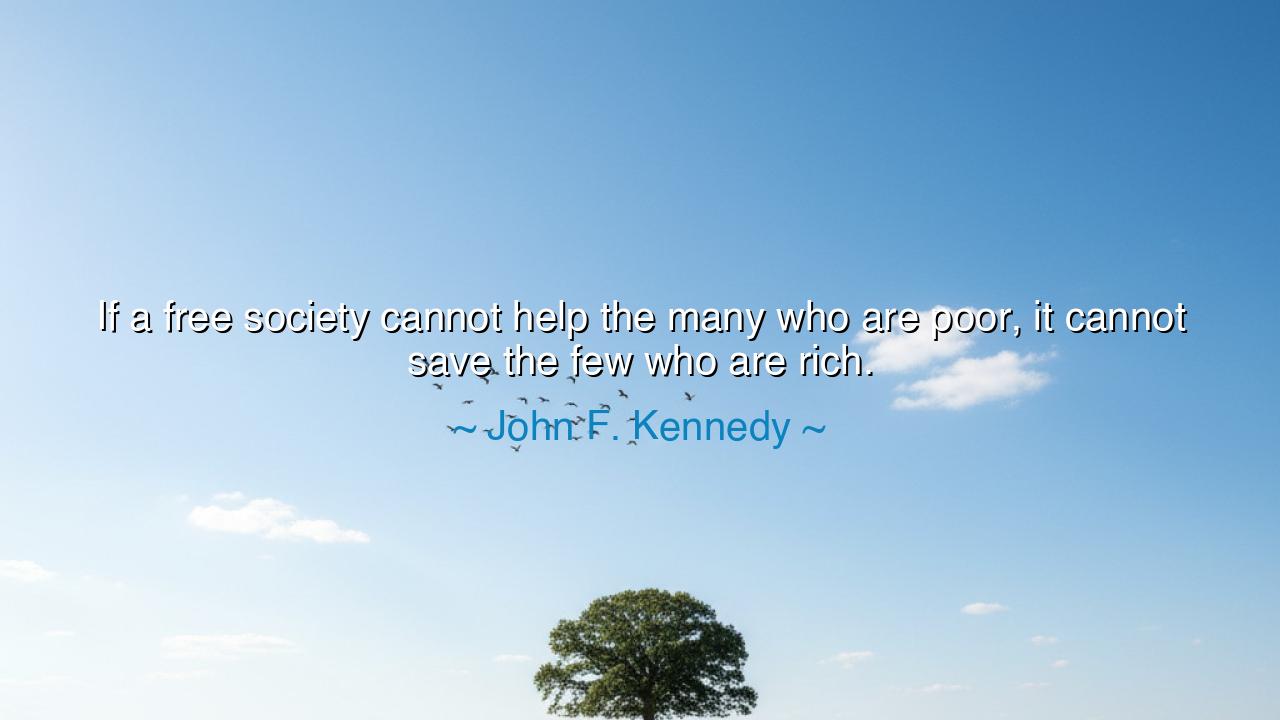
If a free society cannot help the many who are poor, it cannot
If a free society cannot help the many who are poor, it cannot save the few who are rich.






Hear the timeless words of John F. Kennedy, spoken with the solemn weight of truth: “If a free society cannot help the many who are poor, it cannot save the few who are rich.” In this declaration lies both a warning and a vision. For freedom, though precious, is fragile when it dwells in a land of imbalance. A society that abandons its suffering multitudes cannot preserve peace for its privileged few. Poverty, neglected, becomes unrest; inequality, ignored, becomes revolt. Kennedy calls us to remember that the fate of rich and poor is bound together like strands of the same rope—if one frays, all are weakened.
The ancients, too, knew this truth. In Athens, when wealth was hoarded by a few and the poor were left to despair, Solon the lawgiver rose and declared reforms to balance the scales, lest the city collapse into civil war. In Rome, when the plight of the poor was ignored, rebellion and division tore at the Republic’s heart. Thus history teaches us that the strength of the many must be secured, for the safety of the few depends upon it. No man can live in luxury within walls if the world outside is burning with hunger and rage.
Consider the story of the French Revolution. For years, the nobility and monarchy lived in splendor while the common people starved. Bread grew scarce, taxes crushed the poor, and their voices were silenced. The rich believed their wealth and privilege would shield them, but when desperation erupted, their palaces became prisons, and their titles became death warrants. Kennedy’s warning resounds here: a society that does not lift its poor cannot secure its rich, for injustice invites destruction.
But there are brighter examples, too. After the Great Depression in America, leaders realized that relief, reform, and social protections were necessary not only for the survival of the poor but for the preservation of democracy itself. Programs that fed the hungry, put the jobless to work, and restored dignity to families did more than ease suffering—they stabilized the nation. By helping the many, they protected the few, showing that compassion and stability are inseparable.
The deeper meaning of Kennedy’s words is this: freedom is not sustained by wealth alone, but by justice. A free society is not free if it neglects the powerless. For when hunger spreads, when inequality festers, freedom itself is endangered. Tyranny rises when the poor lose hope, for then they are willing to trade liberty for bread. Thus, the preservation of freedom requires the uplifting of the poor—not as charity alone, but as duty, as the very lifeblood of society.
The lesson for us, O listener, is to see beyond our own comfort. If you have plenty, remember that your peace is tied to the well-being of others. Give where you can. Support policies that uplift the weak and heal the broken. Do not despise the poor, for in their struggle lies the test of the nation. Teach your children that greatness is not measured by riches, but by how a society treats its least fortunate. For in strengthening the many, we secure the whole.
Therefore, let Kennedy’s words resound in our hearts: “If a free society cannot help the many who are poor, it cannot save the few who are rich.” Take this as both a commandment and a prophecy. The survival of freedom depends not on towers of gold, but on bonds of justice. Let us bind ourselves to one another, rich and poor alike, so that no one is abandoned, and freedom may endure.
And so let this wisdom endure through the ages: the fate of all is woven together. A nation that lifts its poor lifts itself. A nation that neglects its poor undermines itself. Choose the path of compassion, and freedom shall stand. Choose neglect, and even the wealthiest shall not be saved.






AAdministratorAdministrator
Welcome, honored guests. Please leave a comment, we will respond soon